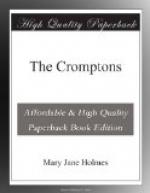As Mr. Mason finished the services and sat down, he was startled with an outburst of “Shall we meet beyond the river.” Everybody joined in the song, negroes and all, their rich, full voices dominating the others, and making Mr. Mason thrill in every nerve as the quaint music filled the house, and went echoing out upon the summer air. When the “Beautiful River” was finished some one outside the door took up the refrain:
“Oh, that will be joyful, joyful,
joyful;
Oh, that will be joyful,
When we meet to part no more.”
This appealed to the blacks, who entered into the singing heart and soul, some of the older ones keeping time with a swinging motion of their bodies, and one old lady in her enthusiasm bringing down her fist upon the doorstep, on which she was sitting, and shouting in a way which warned Jake of danger. He knew the signs, and putting down the little girl, who had fallen asleep in his lap, he went to the old negress, who was beginning to get under full headway, and holding her uplifted arm, said to her:
“Hush, Aunt Judy, hush; this ain’t no place to have the pow’. This ain’t a pra’r meetin’; tis a ’Piscopal funeral, this is, such as they have in Virginny.”
What Judy might have said is uncertain, for there came a diversion in the scene. The child had followed Jake to the door, where she stood wide-eyed and attentive, and when the last words of the hymn ended, she sang in a clear, shrill voice, “Be joyful when we meet to part no more.” Her voice was singularly sweet and full, and Mr. Mason said to himself, “She’ll be a singer some day, if she is not crazy first.” Nothing now could keep old Judy from one more burst, and her “Yes, thank de Lawd, we’ll meet to part no mo’,” rang out like a clarion, and the religious services were over.




